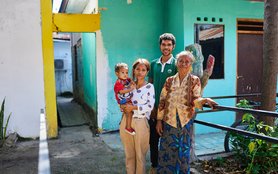G20 countries spend over 15 times subsidizing the coal and oil industry than developed countries provide in adaptation finance to poor and vulnerable countries, said Oxfam today, ahead of the G20 Summit in Antalya, Turkey. Oxfam also urged the G20 leaders to tackle fundamental reforms to ensure the benefits of economic growth is shared by all, as well as commit to a bold new deal for Syria’s refugees.
The signals sent from Turkey by G20 leaders could make or break the global climate deal due to be agreed in Paris in a few weeks.
“G20 leaders spend 15 times more on fossil fuel subsidies than leaders of the developed world spend helping poor countries to adapt. The G20 must stop subsidizing polluters and instead ensure that poor communities receive the money they need to adapt to climate change,” said Oxfam’s Deputy Advocacy and Campaigns Director, Steve Price-Thomas. “Oxfam is looking to political leaders to steer the world towards an ambitious climate deal that will prevent catastrophic warming.”
Turkey is currently home to over 2 million Syrian refugees and 230,000 people from countries such as Afghanistan, Iraq, Iran and Somalia. It is also a key staging post for hundreds of thousands of desperate people on the dangerous journey to Europe.
“Far too many of Syria’s 4 million refugees are living in limbo on dwindling aid and with limited access to legal work, healthcare and education. As a result many families are forced into desperate decisions – to make the dangerous journey to Europe or even return to Syria,” said Price-Thomas. “G20 leaders must commit to a significant increase in humanitarian and development funding to meet the needs of refugees and their host countries; welcome their fair share of refugees through resettlement and by offering other safe and legal routes to their countries; and ensure refugees can access essential services and work to support themselves and their families.”
The G20 has made achieving inclusive growth a key theme of this year’s summit. Leaders are also expected to adopt a package of OECD reforms aimed at tackling corporate tax avoidance. These reforms are a step forward but they will not stop corporate tax dodgers cheating rich and poor countries out of billions in much needed tax revenues every year.
“The G20 say they’re for inclusive growth but are doing little to tackle the 'trickle up' economic model that mainly benefits the rich and has left hundreds of millions of people around the world hungry. Fundamental reforms are needed to ensure the benefits of economic growth are shared by all,” said Price-Thomas. “This must include a second generation of much deeper reforms to global corporate tax rules so that all countries – rich and poor alike – can claim the corporate tax revenues owed to them."


